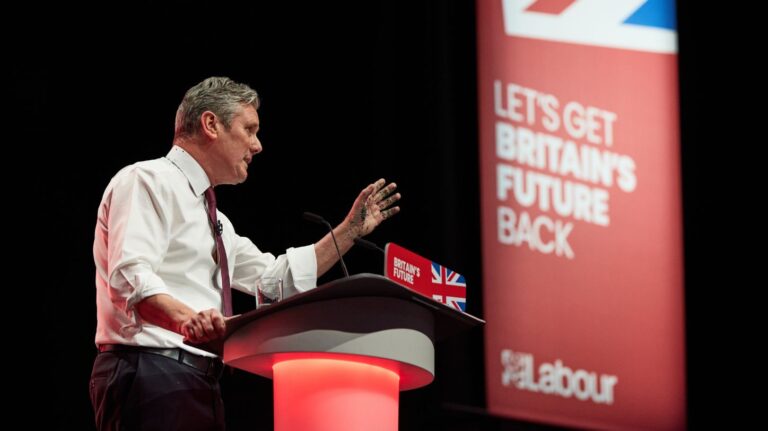The UK transport industry has reacted to Labour’s landslide general election victory with many now keen to see the plan the party laid out in its manifesto enacted quickly.
Labour swept to power on 04 July, with new prime minister Sir Keir Starmer quickly assembling his cabinet.
As expected, Louise Haigh was installed as transport secretary. Haigh had been shadow transport secretary since November 2021 and had previously been the shadow Northern Ireland secretary.
The Labour Party had pledged in its manifesto to bring back the ban on the sale of cars with internal combustion engines to 2030, after former prime minister Rishi Sunak delayed the ban by five years.
It also said it will support the transition to electric vehicles by accelerating the roll out of chargepoints and support the second-hand electric car market by standardising the information supplied on the condition of batteries.
What’s more, Labour’s manifesto on rail includes the re-nationalisation of passenger rail, the installation of Great British Railways and an overhaul of the ticketing structures currently in place.
Incentives for electric vehicles (EVs), maintaining low benefit-in-kind (BIK) tax rates, repairing roads and supporting a sector facing significant change are among the many wants from the industry.
Labour will have the opportunity to set out its upcoming agenda with the state opening of parliament, which is due to take place on 17 July alongside the King’s Speech.
Until then, many figures in the transport sector have been quick to offer guidance, advice and warnings to the newly installed government. CiTTi Magazine rounds-up 20 of the best and most insightful reactions…
 Graham Vidler, CEO, Confederation of Passenger Transport
Graham Vidler, CEO, Confederation of Passenger Transport
The new government has a huge opportunity to use bus and coach services to deliver its key priorities including economic growth, decarbonisation, and relief from recent inflation as well as its targets to shift people away from private car journeys and towards more sustainable public transport. To realise these goals ministers must drive forward policies that help bus operators and local authorities put the right services on the road for local communities.
Stable long-term investment in the bus sector will be critical, but immediate action must prevent a cliff edge return to fully commercial fares when the £2 fare cap ends in December – a scenario that would harm passengers and services.
For the coach sector the government must work strenuously to ensure the EU entry/exit system due to take effect in October does not damage international coach travel. It must also bring forward clear guidance for local transport authorities to include coach in their transport plans and give coaches fair access to all areas (including clean air zones) as part of efforts to curb air pollution and to help unlock the sector’s enormous potential to decarbonise personal travel.
To address persistent shortages of coach and bus drivers, ministers are urged to deliver promptly the proposals about driver training made earlier this year by the Department for Transport, and to ensure the future of both sectors we urge them to work with us to develop and bring forward an effective national workforce strategy.
 Sue Percy CBE, Chief Executive, Chartered Institution of Highways & Transportation
Sue Percy CBE, Chief Executive, Chartered Institution of Highways & Transportation
This is undoubtedly a time for change, necessitating a clear and vision-led approach from both politicians and local and national governments. Transport, despite its political challenges, plays a crucial role in our future, as people and goods need an effective network to support economic activity and social well-being. Good transport provides access to employment, goods, services, and opportunities, and how society invests in and uses this network significantly impacts climate change and public health.
I urge the government to prioritise several key areas to enhance the UK transport network. These include committing to a local roads investment strategy with clear, long-term goals and implementing a place-based sustainable transport hierarchy. The government should explore new funding sources, revenue streams, taxation, and incentives to ensure timely and effective transport network improvements.
Additionally, it is crucial to recognise the highway network as a place of employment and raise public awareness of road worker safety. Reallocating and reprioritising funding to support a genuine move to net zero while meeting economic, social, and environmental goals is essential. Supporting planning rules that encourage place-based solutions to create attractive built environments that reduce the need to travel is vital, as is collaboration on a national transport skills strategy and delivering on the manifesto commitment to reform the bus system.
 Richard Hebditch, UK Director, Transport & Environment
Richard Hebditch, UK Director, Transport & Environment
The new government’s plans have the potential to be transformative for the UK. They would revolutionise our energy system, overseeing an explosion in our renewables capacity that would drastically cut emissions and improve our energy security.
But Labour’s manifesto and statements so far suggest some significant missed opportunities. Transport is the highest-emitting sector in the UK. While Labour’s support for existing policy, like the zero-emission vehicle mandate, and new policy, like improving consumer confidence in EVs and expanding charger rollout, will make a real difference to reducing road emissions, there is a risk of missing three massive opportunities where decarbonisation and growth come hand-in-hand.
Ensuring that emissions fall from trucks, aviation, and shipping is not only vital to keeping the UK in line with its climate goals, it has the potential to secure significant amounts of private investment, infrastructure improvements and jobs. Zero-emission fuel development and production; further renewables expansion; zero-emission truck, plane, and ship production – there is plenty that a new government can take advantage of.
Taking the reins Labour must put itself into gear to become a true climate leader. Transport offers them the opportunity to step into that role and drive the country forward.
 Simon Williams, Head of Policy, RAC
Simon Williams, Head of Policy, RAC
Roads ravaged with potholes. Drivers ripped off at the pumps. No progress on reducing road casualties. To say the incoming transport secretary has a lot to address is a huge understatement, but a new Parliament is a huge opportunity to improve the lives of all road users.
Top of the list has to be the thorny issue of fixing Britain’s broken roads, which will sadly take far more money than the promised £320m from scrapping the A27 Arundel bypass. And the roads funding hole will be even bigger if the previous government’s commitment to spend £8.3bn from the cancelled northern leg of HS2 on improving roads isn’t honoured.
But there are some clear quick wins the new government can take advantage of, should it choose to. The recently legislated Pumpwatch fuel price monitoring scheme must be introduced quickly to give drivers a fairer deal on the forecourt and the official government Private Parking Code of Practice, which will protect drivers from being taken advantage of by unscrupulous parking operators, finally needs to be pushed over the line after five years of delays.
We also want to see the National Parking Platform rolled out as soon as possible so drivers can use one app of their choice to pay for all their parking. Alongside this, we want a firm commitment from the government to ensure drivers always have at least two means of payment. As surprising as it might seem, cash is still the preferred payment method for many.
 Olivia White, Director, Cavendish Consulting
Olivia White, Director, Cavendish Consulting
In transport, we expect to see a focus on local schemes being delivered by combined authorities and a focus on operation, maintenance and delivering projects already in development, rather than new ones. One of the first big decisions for the new transport secretary will be a decision on Lower Thames Crossing, which was moved due to the general election and is now expected on 04 October 2024.
It was great to see plans to promote and grow rail freight in the manifesto, a promise which is in line with Labour’s green commitments, but more challenging than ever with part of HS2 cancelled. With regard to HS2, it will be interesting to see what will become of the previous government’s Network North plans, which were announced with the cancelling of the Manchester leg of the rail project.
 Ian Foley, CEO, Equipmake
Ian Foley, CEO, Equipmake
The transition to electrified vehicles is at a pivotal moment and prime minister Keir Starmer must deliver on his pre-election promises, including the re-instatement of the commitment to the 2030 ICE deadline, which will re-invigorate the entire sector.
New strategy is also needed around the electrification of the UK’s bus fleet. The new government must bring in incentives to reduce the purchase price of a re-powered bus, which will not only reduce pollution and provide the UK bus industry with a much-needed shot in the arm, but transition the entire fleet to zero emissions faster and more cost-effectively than through entirely new electric buses alone.
The UK can and should be a leader in zero emission mobility, and the new government must grasp the nettle and make the most of this incredible opportunity.
 Ben Foulser, UK Head of Future Mobility, KPMG
Ben Foulser, UK Head of Future Mobility, KPMG
After a brief election period, the governing party for the next term has been decided. This marks a significant turning point for transport policy and the chance to advance initiatives urgently needed to address the sector’s recent stagnation. With renewed focus and careful investment, the new government can use transport to boost productivity, progress decarbonisation, improve quality of life, and drive economic growth.
A national transport strategy is essential, integrating all modes of transport – road, rail, maritime, aviation, active travel, and micromobility – into a cohesive network. Policy and funding should aim for an optimal balance, focusing initially on strategic transport corridors and later providing a framework for local strategies. Data should be leveraged in development, execution, and monitoring.
Rail reform must be prioritised, starting with actionable items like the Fares, Ticketing, and Retailing programme. The Plan for Drivers should balance the role of roads and private vehicles with sustainable transport options. Transport appraisal methodologies need to evolve to better account for impacts on land use and housing growth. A review of the rail investment programme is necessary to ensure affordability and strategic coherence post-HS2 cancellation.
The Bus Strategy requires an update, supporting local authorities in transitioning to bus franchising or establishing municipal bus companies, with new funding and capabilities. Policies and legislation for municipal operations and subsidies, including the £2 fare cap, need reconsideration.
Additionally, accelerating the Jet Zero initiative, advancing legislation for connected and automated mobility, committing to electric vehicles, and reviewing governance structures across the transport industry are critical steps. The new ministers have a unique opportunity to transform the UK’s transport sector.
 Sue Robinson, Chief Executive, National Franchised Dealers Association
Sue Robinson, Chief Executive, National Franchised Dealers Association
The National Franchised Dealers Association (NFDA) looks forward to working with the Labour government to address the key challenges facing the automotive retail sector. In the lead-up to the general election, NFDA outlined seven key demands: re-stimulating the private electric vehicle (EV) market, overhauling the apprenticeship levy, mandating annual public chargepoint targets, planning future road pricing, removing unfair regulations for heavier electric vans, increasing HGV MOT capacity with delegated testing, and reducing business rates.
From 30 May to 14 June, NFDA surveyed its members, receiving 51 responses from franchised dealership groups across the UK, representing more than 300 sites. The top three issues affecting businesses are slowing demand in EVs and meeting ZEV mandate targets (69% ranked this first), attracting and retaining quality staff due to a skills shortage (33% ranked this second), and a lack of charging infrastructure (24% ranked this second).
The top issues dealerships want the next government to address are re-stimulating the private electric vehicle market (41% ranked this first), reforming business rates (32% ranked this first), and increasing and improving EV charging infrastructure (27% ranked this second).
Dealerships have clearly expressed their views, making it crucial their voices are heard. It is essential the government works with the automotive sector to support these key issues and unlock the sector’s potential.
 Thom Groot, CEO, Electric Car Scheme
Thom Groot, CEO, Electric Car Scheme
If Labour is going to have any chance of fulfilling the laudable, but ambitious, reintroduction of the 2030 ZEV mandate, they need to do three things right away. Extend low BIK rates until 2035 at 5%. Lower the VAT on public charging to 5% to bring in line with the cost of electricity at home. And avoid the temptation to impose tariffs on affordable EVs from outside the UK. They don’t do us any favours in terms of reaching Net Zero and don’t solve other problems. We know from our research that for 68% of Brits affordability is the biggest barrier to getting an EV and 53% feel they can’t afford to cut their carbon footprint, so we need to be doing all we can to bring down cost.
Keir Starmer will have a bulging in tray over the next few months, but he and his government cannot afford to let this key policy fall down the priority list. If this happens again, as it did under the Tories when the deadline was initially extended, the goal risks becoming totally unrealistic. What the industry, and the public, needs is a clear plan to reach 100% EV sales by 2030.
Even the latest figures put the market share for fully electric vehicle sales at just 19%, and 16.6% for the year to date, which is already behind the proportion needed to reach the deadline by 2035, let alone 2030.
 Joe Tighe, CEO, KleanDrive
Joe Tighe, CEO, KleanDrive
The new government must rapidly reassess the Zero Emission Bus Regional Areas (ZEBRA) scheme to include incentives for the conversion of existing diesel buses to electric.
The cost of re-powering a diesel bus is significantly lower than purchasing a new battery-electric bus. With a saving of £350,000 per bus, this approach can lead to substantial financial savings. For example, even if just a quarter of the UK’s buses were re-powered instead of replaced, the total savings would be more than £3bn.
We know the government has limited funds but big ambitions, and the UK needs to hit its environmental goals as quickly as possible. Government support for re-powering current vehicles rather than purchasing entirely new ones will not only support the UK economy, but is a far more cost-effective, and faster way to transition the bus fleet to zero emissions and accelerate the improvement of air quality in urban areas.
 Sam Pooke, Senior Public Affairs Manager, FreeNow UK
Sam Pooke, Senior Public Affairs Manager, FreeNow UK
The newly elected Labour government has a lot of work to do when it comes to VAT treatment for private hire journeys to ensure the regime is fair and there is a level playing field across the industry. We encourage the new government to work closely with the Mayor of London to tackle existing challenges in the taxi sector, particularly reversing the declining number of black cab drivers and the high cost of electric vehicles to ensure this iconic trade can thrive and continues providing its outstanding service to Londoners and visitors.
 Mike Hawes, Chief Executive, Society of Motor Manufacturers and Traders
Mike Hawes, Chief Executive, Society of Motor Manufacturers and Traders
The next five years will be decisive, with a once-in-a-generation switch to zero-emission vehicles alongside the rise of connected and automated vehicles – all against a backdrop of rising global competition as countries seek to put their own automotive markets and manufacturing ahead of the game. The need for policymaking that backs the sector is as important as ever.
Automotive’s role as a driving force for economic growth is clear: UK businesses employ 800,000 people in well paid and rewarding jobs across the country, automotive remains Britain’s largest export sector and is essential to the nation’s decarbonisation goals. The right policies in the next parliament will be those that deliver a globally competitive industrial strategy, affordable and sustainable energy, a mass EV market, strong free trade relations and a workforce that’s skilled up for the future.
Indeed, the UK has the potential to build more than a million of the very greenest models every year by 2035, provided it can sustain investment though increased competitiveness. With the global industry shifting to EV production and manufacturers tending to locate near to where their products are sold, the new government must create the conditions for mass EV adoption in Britain.
Accelerating EV adoption requires a bold plan to make zero emission mobility possible for everyone, with incentives for EV purchases, fairer VAT on public charging and infrastructure that’s rolled out in every part the country, ahead of need. A plan for decarbonising light and heavy commercial vehicles, buses, coaches and minibuses – along with a dedicated infrastructure strategy – is also essential to keep Britain’s businesses, services and public transport on the move.
Britain’s progress towards those goals must begin now and with it will come huge economic, environmental and social benefits. Automotive manufacturers have invested vast amounts in the net zero emission transition over the past decade and while the commitments of 2023 were a massive vote of confidence, the country must move even faster in the next five years.
 Stuart James, Chief Executive, Independent Garage Association
Stuart James, Chief Executive, Independent Garage Association
Key areas of focus for the new Labour government should include attracting new talent and addressing the unique challenges faced by the automotive industry in terms of apprenticeships. The sustainability and growth of the independent garage sector depend on the ability of the sector to attract and retain skilled professionals.
As the industry evolves with new innovations, it is essential for independent garages to adopt these technologies to meet the growing demand for the repair and maintenance of zero-emission vehicles. The sector is eager for initiatives that provide garages with the tools and knowledge needed to embrace these advancements, in line with the government’s zero-emission vehicle mandate, which became law on 03 January, 2024.
The independent garage sector is vital to the economy, managing 70% of the UK’s vehicle service and maintenance work. It is essential that apprenticeship policies take into account the unique challenges and opportunities this sector faces as automotive technology advances more rapidly than ever before.
 Julian Maynard, Managing Director, Transport Design Consultancy
Julian Maynard, Managing Director, Transport Design Consultancy
Let’s hope the new government will invest in transport infrastructure to regenerate and connect our towns and cities. The success of the new Elizabeth Line, which saw more than 150 million journeys in its first year alone, has made it clear that the UK has the skillset and expertise to deliver. It’s something we must capitalise on for growth across the country.
 Gerry Keaney, Chief Executive, British Vehicle Rental and Leasing Association
Gerry Keaney, Chief Executive, British Vehicle Rental and Leasing Association
Following a period of great political uncertainty, the industry collectively hopes for stability that will allow action to be taken and progress to be achieved. The time for blanket decarbonisation policies has been and gone. As the transition toward cleaner, greener vehicles evolves, the need for specific interventions becomes clear. Up to now, powerful tax incentives for company-provided cars have accelerated adoption among fleets but left retail and rental lagging. For the transition to be embraced by all sectors, targeted action is needed. Charging infrastructure, the used market, and vans are just three of the areas demanding closer attention.
 Ian Hughes, CEO (corporate division), Zenith
Ian Hughes, CEO (corporate division), Zenith
What the sector needs right now is clarity on the transition to EVs, which in turn, will breed consumer confidence and increase adoption.
As an industry, we’ve seen the 2030 deadline on the sale of ICE vehicles pushed back, infrastructure targets being missed, and a host of misinformation in the press, which is ultimately impacting the pace at which the UK can meet its net zero targets. We hope a new government can make a start on building that confidence.
Labour’s manifesto highlighted one or two actions that could make a welcome difference, and we need these to be a top priority. However, it is vital that we urgently see the introduction of measures that incentivise used BEVs through either a reduction of VAT or a grant direct to the consumer. This will promote adoption and supercharge engagement to ensure the market starts to work efficiently and correctly.
 Mike Nakrani, CEO, VEV
Mike Nakrani, CEO, VEV
The new government’s pledge to reinstate the 2030 ICE ban and accelerate EV charging infrastructure, is a positive signal for the e-mobility industry. Whilst commercial fleets are already leading the way in the transition from diesel to EVs, this is reliant on fleet-owners building their own charging infrastructure in their depots.
Transport and logistics suppliers are key contributors to scope 3 carbon emissions, moving goods and services through the country’s supply chains, and they need a network of charging infrastructure across the country – ‘green corridors’ – or funding support to build it.
The new government’s pledge to deliver £1.8bn investment in our port infrastructure would be a key element of the UK’s net zero journey. As hubs that feed our supply chains and the economy itself, ports are talking to us about how electrification of their supply chains will be a major step forward in UK decarbonisation.
 Chris Allen, Managing Director, London Electric Vehicle Company
Chris Allen, Managing Director, London Electric Vehicle Company
The new prime minister and his party have made a promise to accelerate the UK’s transition to an electrified future, including a pledge to reinstate the 2030 ICE ban, which we welcome. However, to deliver on this ambition and seize the opportunities for manufacturing growth that will enable it, we need targeted consumer incentives to continue for commercial and niche vehicle drivers, including for taxis.
More than half of London’s black cabs are now zero-emission capable – with uptake growing in towns and cities nationwide. To keep momentum, the new government must continue the Plug-in Taxi Grant beyond the current financial year. Removing VAT from public charging networks will also keep costs down for business (and private) users to help ensure switching to an EV is an equitable choice for those without access to home charging.
The new government must also outline a clear industrial strategy to provide some much needed certainty to help secure investment in the UK. This investment will be critical to driving supply-chain development and helping to maximise the input of the country’s high skills base and manufacturing excellence. These elements will be key in affirming the UK’s relevance in the developing global automotive landscape.
 Richard Staveley, CEO, EO Charging
Richard Staveley, CEO, EO Charging
The Net Zero mandate, a crucial objective for climate control, must continue under the new government. The Labour Party’s election manifesto, to positively impact climate change by accelerating the move to greener transport and developing the necessary infrastructure for electric vehicles (EVs) is welcomed by the sector. Now, at this critical time for climate change, the industry needs determined action and expects the Labour government to deliver on their election manifesto.
Transport is responsible for almost a quarter of global emissions, with commercial fleets accounting for a large proportion of this. Emission-free transport is essential to ensuring the UK meets its Net Zero mandate, so making the transition to EVs will be a crucial component.
We already know that developing and investing in the right infrastructure to support electrification is important, but focusing on the electrification of commercial and public sector fleets is fundamental. We need to see Labour developing and implementing a strategy that tackles the challenges to EV adoption and creates long-term reliable funding, particularly for commercial and public sector fleets, which stand to have the greatest environmental impact.
The Society of Motor Manufacturers and Traders found that out of the 679,822 EVs sold in the UK in 2024 so far, 407,661 were across the fleet sector. However, due to the high initial costs of electrification, commercial and public sector fleets often rely on local governments to distribute EV funding. We’ve already seen a dramatic positive impact from initiatives such as the Zero Emission Bus Regional Areas (ZEBRA) scheme that have enabled bus operators to electrify their fleets at pace. Introducing similar schemes to support commercial fleet electrification will undoubtedly have a positive impact and will accelerate EV fleet adoption. If funding does not materialise, this will delay fleet electrification, and achieving Net Zero goals will become incredibly difficult.
Labour must commit to a robust funding strategy that transcends local politics and ensures a stable environment for fleet operators to transition to EVs. Exploring alternative funding models such as Scotland’s direct-to-operator approach, which streamlines the process and empowers fleets to use resources effectively, could be another answer.
 Richard Moore, Battery Strategy Expert, Greenpower Park
Richard Moore, Battery Strategy Expert, Greenpower Park
The next UK government must accelerate domestic battery production to attract further global battery manufacturers, as well as the associated supply chain, to invest in the UK.
Securing battery cell supply in the UK today is as vital as securing steel was in the 1940s and 50s. The UK urgently needs to acquire a security of supply for battery cells to ensure the country meets the massive power demands as the world transitions to electric energy use and storage. It’s a huge challenge and so far, the UK is lagging behind many other global countries, such as the USA, France and Spain, when attracting multiple investors. And if we act now, we can still resolve the crisis.
But the UK has got to get its head out of the sand if it thinks it’s going to hit its battery cell targets. The government and stakeholders have been slow to react to battery cell supply demands. If the next government doesn’t take action, there will be a major risk to the security of energy supply, which will leave the nation in a perilous state.





